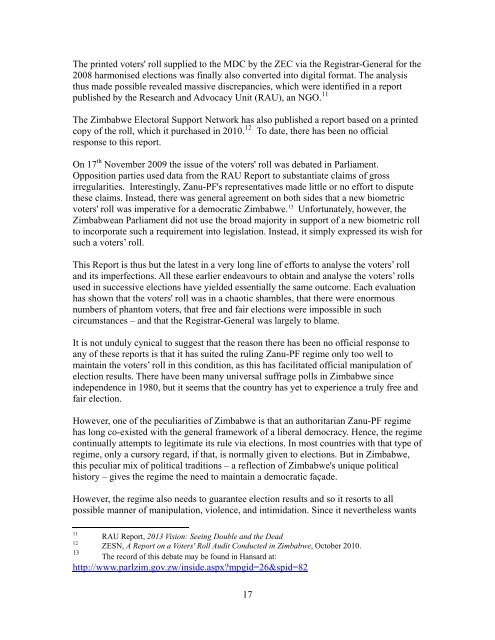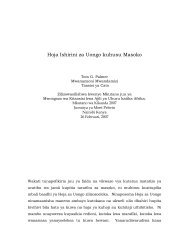Preventing Electoral Fraud report SAIRR May 11 ... - AfricanLiberty.org
Preventing Electoral Fraud report SAIRR May 11 ... - AfricanLiberty.org
Preventing Electoral Fraud report SAIRR May 11 ... - AfricanLiberty.org
You also want an ePaper? Increase the reach of your titles
YUMPU automatically turns print PDFs into web optimized ePapers that Google loves.
The printed voters' roll supplied to the MDC by the ZEC via the Registrar-General for the<br />
2008 harmonised elections was finally also converted into digital format. The analysis<br />
thus made possible revealed massive discrepancies, which were identified in a <strong>report</strong><br />
published by the Research and Advocacy Unit (RAU), an NGO. <strong>11</strong><br />
The Zimbabwe <strong>Electoral</strong> Support Network has also published a <strong>report</strong> based on a printed<br />
copy of the roll, which it purchased in 2010. 12 To date, there has been no official<br />
response to this <strong>report</strong>.<br />
On 17 th November 2009 the issue of the voters' roll was debated in Parliament.<br />
Opposition parties used data from the RAU Report to substantiate claims of gross<br />
irregularities. Interestingly, Zanu-PF's representatives made little or no effort to dispute<br />
these claims. Instead, there was general agreement on both sides that a new biometric<br />
voters' roll was imperative for a democratic Zimbabwe. 13 Unfortunately, however, the<br />
Zimbabwean Parliament did not use the broad majority in support of a new biometric roll<br />
to incorporate such a requirement into legislation. Instead, it simply expressed its wish for<br />
such a voters’ roll.<br />
This Report is thus but the latest in a very long line of efforts to analyse the voters’ roll<br />
and its imperfections. All these earlier endeavours to obtain and analyse the voters’ rolls<br />
used in successive elections have yielded essentially the same outcome. Each evaluation<br />
has shown that the voters' roll was in a chaotic shambles, that there were enormous<br />
numbers of phantom voters, that free and fair elections were impossible in such<br />
circumstances – and that the Registrar-General was largely to blame.<br />
It is not unduly cynical to suggest that the reason there has been no official response to<br />
any of these <strong>report</strong>s is that it has suited the ruling Zanu-PF regime only too well to<br />
maintain the voters’ roll in this condition, as this has facilitated official manipulation of<br />
election results. There have been many universal suffrage polls in Zimbabwe since<br />
independence in 1980, but it seems that the country has yet to experience a truly free and<br />
fair election.<br />
However, one of the peculiarities of Zimbabwe is that an authoritarian Zanu-PF regime<br />
has long co-existed with the general framework of a liberal democracy. Hence, the regime<br />
continually attempts to legitimate its rule via elections. In most countries with that type of<br />
regime, only a cursory regard, if that, is normally given to elections. But in Zimbabwe,<br />
this peculiar mix of political traditions – a reflection of Zimbabwe's unique political<br />
history – gives the regime the need to maintain a democratic façade.<br />
However, the regime also needs to guarantee election results and so it resorts to all<br />
possible manner of manipulation, violence, and intimidation. Since it nevertheless wants<br />
<strong>11</strong><br />
12<br />
13<br />
RAU Report, 2013 Vision: Seeing Double and the Dead<br />
ZESN, A Report on a Voters' Roll Audit Conducted in Zimbabwe, October 2010.<br />
The record of this debate may be found in Hansard at:<br />
http://www.parlzim.gov.zw/inside.aspx?mpgid=26&spid=82<br />
17



